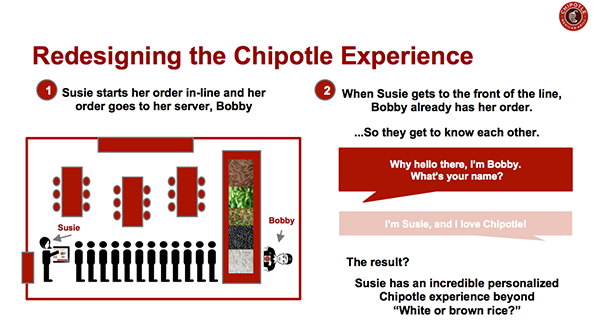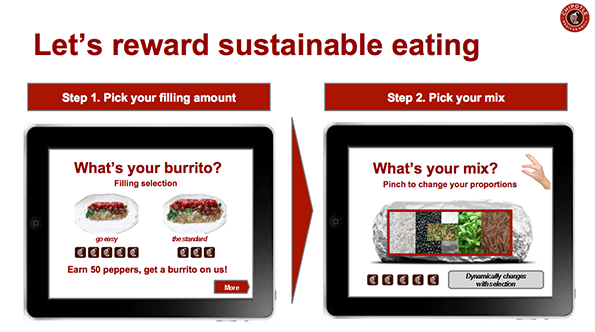“Burrito Creep” isn’t some weird guy behind you in line at Chipotle Mexican Grill.
Rather, it’s a term that Chipotle employees have started to use to define the burritos that keep getting bigger — and with the added size, the more leftover, uneaten burrito parts that end up in the trash.
Food+Tech Connect's Hack//Dining hackathon in New York City in June produced insightful solutions to big questions faced by such sponsors as Chipotle Mexican Grill, Batali & Bastianich Hospitality Group and Google.
The stated mission was to “re-engineer the future of food” through the use of technology to created a more sustainable foodservice industry.

“The problems in the food industry are complex, and they aren’t going to be solved in a weekend,” Danielle Gould, founder of Food+Tech Connect, told Sustainable Brands. “The point is to get new ideas into circulation, new people working on this, and to do rapid prototyping — to actually make a real product in a weekend.”
Chipotle posed the question: “How might we use technology to enable quick-service restaurants to better measure and manage their actions to operate in a more environmentally sustainable way?”
Nathanael Johnson (@savortooth on Twitter), a food writer at the Grist website, recounts how the team of Brian Callaway, Marc Loeffke, Kevin Taniguchi and Alice Yen came up with the idea to give customers an incentive to control portions and cut back on the most carbon-intensive ingredients, such as meat.
“Chipotle trains workers to scoop out a precise amount of each ingredient,” Johnson wrote. “But as customers come through the line, people nudge the servers for more: ‘Can I have a little extra guac?’ No one ever asks for less. Over time, the servers begin to preemptively increase the portions. The burritos creep, they grow, they expand to sizes that menace children and small dogs.
“In a quick survey of people leaving a Chipotle,” Johnson added, “the team found that nearly 60 percent of the customers hadn’t finished their food.”

The hackers came up with a solution — an add-on to Chipotle’s existing smartphone app — that rewarded customers for slimming down their orders.
“Choose a smaller size, and you earn points that you can redeem for another burrito,” Johnson recounted. “The app also awards points for opting out of the more carbon-intensive ingredients — for example, you can reduce the meat portion by pinching down the meat section in a stylized cross-section of the meal.”
Chipotle representatives told the hackers they wanted to maintain the face-to-face interaction with the brand’s customers.
“The team did a back-of-the-envelope calculation and estimated their app could save Chipotle over $100 million a year and save 115,000 tons of carbon — though Yen admits that the Chipotle representatives politely suggested that these calculations might be significantly off,” Johnson reported.
In an interview after the event, hackers Yen and Callaway talked further about their Chipotle idea and how “food waste is a huge opportunity” for brands to save money and tap into sustainability.
“I feel like someone is going to be doing this,” Callaway said, during the video interview. “We did open-source everything. Hopefully this idea can keep rolling. Chipotle is not the only one. Let’s use technology as much as we can to make a more efficient process and also to incentivize people to make healthier lifestyle choices.”
Watch the interview below:
Contact Ron Ruggless at [email protected].
Follow him on Twitter: @RonRuggless




